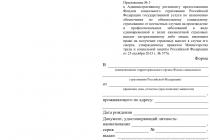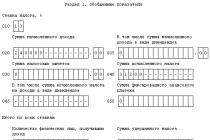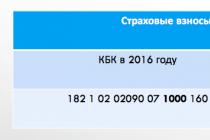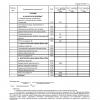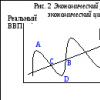Partner
On January 1, 2015, as part of the fight against offshore companies in Russia, the so-called “deoffshorization” amendments to the Tax Code of the Russian Federation came into force. Below is a set of actions that an individual must take if he has registered or bought shares in a foreign company.
In relation to the controlling person of a tax resident of the Russian Federation - a taxpayer - an individual
| Grounds for submission | Documents Application | A responsibility | ||
| 1) emergence(registration of a company or purchase of shares) participation (direct or indirect, or through nominal persons, or actual) in companies: a) over 10% 2) Share change(number of shares) or order of participation(direct, indirect) in company 3) Termination of participation(liquidation, sale of all shares) in the company |
3 months from the date of occurrence / termination / change of control | Documents are NOT required |
Article 129.6 of the Tax Code of the Russian Federation 50 000 rub. for each company Statute of limitations - 3 years from the date on which the notice of participation is overdue- after 3 months from the date of occurrence / change / termination of control - clause 1 of article 113 of the Tax Code of the Russian Federation. For companies incorporated BEFORE May 15, 2015, the Notice of Participation must be filed by June 15, 2015, from which date the statute of limitations must be calculated. The statute of limitations for such companies will expire on June 15, 2018. |
|
| Grounds for submission | Documents Application | A responsibility | ||
| Control (direct or indirect, or through nominees, or actual) over the company: 1) over 25% |
until March 20 of the year following the tax period in which income in the form of CFC profit is recognized as the controlling person | 1) CFC profit - less than 30 million rubles. (for 2016), clause 6 of article 25.15 of the Tax Code of the Russian Federation Submission of the Declaration 3-NDFL - not required IMPORTANT: The tax authority has the right to request the taxpayer to submit any documents confirming the accuracy of the information stated in the Notice. In this connection, we believe that those whose CFC profit does not exceed the established thresholds should be prepared to provide relevant supporting documents - financial statements and an auditor's report that does not contain a negative opinion 2) CFC profit CFC profit is taken into account when determining the tax base for personal income tax of the controlling person. Documents are NOT required Submission of Declaration 3-NDFL is required 3) an "active" company (as well as other grounds exemption of CFC profits from taxation clause 1 of article 25.13-1 of the Tax Code of the Russian Federation) Clause 1, Article 25.13-1 of the Tax Code of the Russian Federation 9. I have a KIK, but I have not yet decided whether I will “show” it in Russia. What is the difference between filing it myself with a missed deadline and paying a fine, or paying the same fine after the tax office finds out about it?Penalty for failure to notify participation in foreign organization in time entails the imposition of a fine in the amount of 50 000 RUB. Even if you submitted the notification yourself, you will still need to pay the fine. If you wait until the tax authorities themselves find out (or maybe not find out) about the company, then you additionally run the risk of imposing the following fines: | ||
A foreign company, a certain part of the shares of which is owned by tax residents of our country, is a controlled foreign company (hereinafter - CFC). This legal structure applies tax authorities different countries. CFC legislation was introduced to prevent tax evasion. And there is nothing illegal about owning shares in a foreign legal entity. But many states require you to declare the existence of such shares and pay taxes on them.
Publication
Tax evasion is now considered a criminal offense in many countries. With the improvement in the exchange of information between tax authorities, it is becoming less and less appropriate to risk not declaring the presence of financial interests abroad.
Amendments were adopted to the Tax Code of the Russian Federation that amend and clarify the provisions of the legislation on CFCs. Changes were made by Federal Law No. 32-FZ dated February 15, 2016.
The law comes into force in three stages:
- most of the provisions are retroactive and apply to legal relations that arose from January 1, 2015;
- certain provisions of the law, for example, on an extended period for filing notifications
- on participation in a foreign company, effective from March 15, 2016;
- a small group of rules, in particular, specifying the conditions for tax exemption for issuers of tradable bonds, will come into effect from January 1, 2017.
A CFC can choose a profit calculation option and reporting standards
Financial reporting rules have changed. The tax authorities will begin to accept financial statements prepared on their own initiative by offshore companies (subclause 1, clause 1.1, article 309.1 of the Tax Code of the Russian Federation). Offshore companies have the right to prepare reports according to international standards, and not only according to the rules of Ch. 25 of the Tax Code of the Russian Federation.
The new law gives the taxpayer the right to choose the option by which the CFC profit will be calculated:
- according to the financial statements of a foreign company;
- according to the rules set out in 25 of the Tax Code of the Russian Federation for Russian organizations.
The standards that can be used in reporting have been specified (clause 1.2 of article 309.1 of the Tax Code of the Russian Federation). Russian tax will be accepted:
- a) the standards established by the personal law of the CFC (if any);
- b) international financial reporting standards (IFRS), if the standards are not established by law (for offshore companies);
- c) standards recognized by foreign exchanges.
Dividends from foreign organizations actually paid by Russian organizations are exempt from taxation in the Russian Federation. For this, the following conditions must be met:
- tell the tax according to Art. 312 of the Tax Code of the Russian Federation on the actual right to profit of the company;
- provide documentary evidence of the withholding of tax at the source by a Russian organization (clause 58 of article 217 and clause 50 of article 251 of the Tax Code of the Russian Federation).
Rules have been adopted that may be useful in the dissolution of foreign holdings, as well as for CFCs trading on the securities market. These rules start to work if:
- a CFC transfers its securities (for example, shares of other companies) to its controlling entity (or its Russian affiliate);
- before January 1, 2018, the CFC is being liquidated.
At individual(buyer) will not arise material gain when acquiring such securities from a CFC at a price below the market price (subclause 3, clause 1, article 212 of the Tax Code of the Russian Federation).
An individual will be able to reduce his income in the subsequent sale of such securities. Income is reduced by the lesser of the following amounts ( property deduction): value according to CFC accounting data or market value securities as of the date of transfer of ownership from the CFC (clause 13.1, article 214.1, article 220 of the Tax Code of the Russian Federation). And the Russian organization (controlling person) will be able to reduce its income from the sale by the purchase price (clause 2.1 of article 268 of the Tax Code of the Russian Federation).
Previously, there was one obvious way to disband a holding company with a subsidiary (factory) in the Russian Federation and not fall under taxes. This method is the liquidation of the parent company and the implementation of benefits for nominal owners under the law on declaration (amnesty). New incentives now allow shares to be transferred subsidiaries to the beneficiary or related parties at any documented cost, including below market value.
Foreign structures and other CFCs received expanded regulation
Beneficiaries foreign structures without education legal entity(hereinafter referred to as a foreign structure) are no longer required to submit special notifications on control over such structures or on the actual right to income received by such structures (subclause 2, clause 3.1, article 23). According to the terminology of the Tax Code, a foreign structure belongs to the category of controlled foreign companies, therefore this obligation excluded quite naturally as a duplicating obligation to notify about a CFC.
The founder of a foreign structure (but no longer the beneficiary) retains the obligation to notify the tax authority of the establishment of such a structure. This provision is significant enough to increase the popularity of structures such as discretionary trusts. In discretionary trusts, the beneficiaries generally receive income from the trust but do not have control over the company. Now the trust manager is not required to disclose both the CFC and his actual right to income from the trust structure until he has distributed the profit in favor of a specific beneficiary.
And another important provision, which is designed to strengthen the position of trust managers in the market. If the trust itself is not controlled, then the participation realized through this trust in other foreign organizations is not recognized as control over such organizations. This conclusion follows from new edition paragraph 6 of Art. 105.2 of the Tax Code of the Russian Federation. Thus, there is a completely legal situation when a foreign company, previously owned by a resident of the Russian Federation, is no longer considered controlled.
With the new law, the founders of a foreign structure, as well as their close relatives, are free to make contributions to the structure and withdraw these funds (and property) back, since such contributions do not generate income (profit) (clause 1.1, article 25.15 of the Tax Code of the Russian Federation). Operations of the founder or his close relatives to receive income within the limits of such a contribution, and which are not distribution of profits, are not subject to personal income tax (clause 67 of article 217 of the Tax Code of the Russian Federation). However, with the proviso that these operations are carried out in the absence of retained earnings. If the profit is not distributed, then each distribution of income is considered
as a distribution of taxable profits.
Foreign legal entities for which participation in the capital is not provided (funds, shtichtings, etc.) received additional regulation. They are equated to foreign structures without the formation of a legal entity. A contribution to such a legal entity does not form its income (profit) (clause 1.1, article 25.15 of the Tax Code of the Russian Federation). Receipt of income from such persons, which is not a distribution of profits, is exempt from taxation (clause 67, article 217 of the Tax Code of the Russian Federation). Profit can be reduced by the amount of distributed profit (clause 1, article 25.15 of the Tax Code of the Russian Federation).
Rules for declaring participation in a CFC have changed
Changes in the legislation on CFCs also affected the declaration of participation in CFCs. There were innovations in terms, persons, responsibilities. An important change was the correction of the discrepancy between the share of participation and the profit share of the taxpayer. This adjustment closed a loophole that allowed the taxpayer to not disclose its involvement.
Deadline for notifications. From March 15, 2016, the deadline for filing notifications of participation (in case of changes in the shares and the procedure for participation) has been extended from one to three months (clause 3, article 25.14 of the Tax Code of the Russian Federation).
Trustees. The obligation to disclose will also fall on Russian property trustees if they contribute such property to the capital of a foreign organization or transfer this property to foreign structures established by them. Trustees are required to disclose their participation in a foreign company and the fact of the establishment of foreign structures (clause 3.3, article 23 of the Tax Code of the Russian Federation).
Individuals. An individual who has become a tax resident of the Russian Federation after acquiring shares in a foreign company (after establishing a foreign structure) will be required to submit a notification of participation no later than March 1 of the next year, but on condition that by December 31 of the current year he has saved more than 10 % shares (Clause 3, Article 25.14 of the Tax Code of the Russian Federation).
public companies. Taxpayers participating in a foreign company through a Russian public company do not need to submit a notice of participation, as well as a notice of a CFC (Clause 3, Article 25.14 of the Tax Code of the Russian Federation).
permanent representations. Permanent representative offices of foreign companies in the Russian Federation, owning movable property(fixed assets) are no longer required to disclose the ownership of their parent company. This obligation now only applies to companies that own real estate. Previously, the Tax Code did not specify the type of property (Clause 3.2, Article 23, Clause 3, Article 386 of the Tax Code of the Russian Federation).
A responsibility. The procedure for bringing to responsibility for the fact of non-disclosure of a CFC has been clarified (paragraphs 8–11 of article 25.14 of the Tax Code of the Russian Federation). It is important that direct shareholders of a CFC with more than 10% of shares will receive exemption from fines for non-payment of tax, as well as for non-disclosure of their participation in a CFC, even if they submit a notice of a CFC in violation of the deadline, but at the personal request of the tax authority. In this case, penalties are not charged on the amount of tax (clause 11, article 25.14 of the Tax Code of the Russian Federation). Responsibility for a gross violation of the rules for accounting for income and expenses and objects of taxation and for other types of violations is not excluded.
The ratio of the share of participation and the share of profit. Previously, the profit of a CFC was imputed to the taxpayer in the amount corresponding to its share in the capital, which allowed for a situation with different classes of shares, when the owner preferred shares received 90% of the profits of the CFC, while owning less than 10% of the shares, which allowed him not to disclose his participation. From January 01, 2017, a new version of paragraph 3 of Art. 25.15 of the Tax Code of the Russian Federation, according to which, in the event of such a dissonance, when the taxpayer's share in the CFC differs from its share in the CFC's profit, the share corresponding to the share in the CFC's profit will be taken into account. True, this rule still applies to companies that prepare financial statements in accordance with the personal law of the state. Offshore territories do not apply to these rules.
A foreign company can recognize itself as a tax resident
The tax period is defined for foreign organizations that do not have permanent representative offices in the Russian Federation and independently recognize themselves as tax residents (clause 6, article 55 of the Tax Code of the Russian Federation). Companies can recognize themselves as a resident by choice: from January 1 of the calendar year in which an application is submitted to recognize themselves as a tax resident of the Russian Federation; from the date of filing of said application.
AT current year a foreign organization has the right to recognize itself as a resident only from January 1, 2016, but not earlier. This leads to the conclusion that in relation to 2015 such an organization can be recognized as a CFC, which is not entirely logical.
There are questions that the legislator has not answered
The procedure for compulsory recognition of a foreign organization as a resident of the Russian Federation by decision of the tax authority has not been determined. It is not clear from what moment the tax period begins for those foreign organizations that have permanent representative offices in the Russian Federation. Uncertainty remains as to whether a CFC notification should be filed if the CFC profit does not exceed the established threshold of 50, 30, or 10 million rubles. From the new edition of paragraph 2 of Art. 25.14 of the Tax Code of the Russian Federation
No, the notification is submitted when the profit of the CFC is recognized as the income of the controlling person in the relevant period (Clause 2, Article 25.14 of the Tax Code of the Russian Federation). At the same time, the Tax Code of the Russian Federation does not operate with the concept of "recognition of income" - this is an "invention" of the law in question, which gives rise to ambiguous interpretations.
The management of LLC MFC "InkassoExpert" expresses its gratitude to the Auditing Company "Kamerton-AK" for conducting the audit for 2017. The audit showed that the specialists of "Kamerton-AK" have a high professional level, are friendly, disciplined and responsible
Yasakov S.S. CEO LLC MFC "InkassoExpert"
Specialists of the company "Kamerton-AK" produced qualitative analysis systems accounting and financial support our institution; clarified the requirements of the current legislation, conducted a qualitative legal analysis of business contracts concluded by the institution; provided the necessary consulting assistance to the administration of the institution in the organization and accounting of financial and economic activities.
Mayorov A.N. Director of GBU TsD "Personality"
When providing project development services accounting policy, the specialists of "Kamerton-AK" carried out a qualitative analysis of the accounting and taxation system of our institution; provided the necessary consulting assistance to the administration and accounting in organizing accounting for financial and economic activities.
Prokhorova N.D. Chief Accountant FBUZ "Treatment and Rehabilitation Center of the Ministry of economic development Russian Federation»
Consulting services in the field of accounting and taxation. were provided by specialists of LLC Auditing Company "Kamerton-AK" in a timely manner and at a high quality level. Taking into account the results of the analysis of the quality and timeliness of the provision of consulting services, we propose to continue cooperation with Auditing Company "Kamerton-AK" LLC by concluding a consulting agreement for 2013
Urin V.G. General Director of GBUK Moscow "MAMT"
In the process of carrying out audit activities, the specialists of LLC Auditing Company "Kamerton-AK" provided the necessary consulting assistance in organizing the accounting of our autonomous institution, explained the provisions and requirements of the current legislation, which are not clearly spelled out in normative documents, gave useful tips to solve current problems of financial and economic activity.
Dytynis G.D. Director of GAU NO "Department of State Expertise"
During the period audit specialists of LLC Auditing company "Kamerton-AK" made a qualitative analysis of the tax and accounting system of our institution. They provided the necessary consulting assistance, explained the requirements of the current legislation, which were not clearly spelled out in the regulatory documents.
Osmanov S.P. Head of FAU "Glavgosexpertiza of Russia"
Specialists of LLC Auditing Company "Kamerton-AK" conducted a detailed analysis of the balances on the accounting accounts of KP "Sports Complex" Krylatskoye "for the purpose of qualitative and complete transfer of them to the accounts of accounting created on its basis by the State Budgetary Institution "Sports Complex" Krylatskoye "Moskomsport
Budilin V.G. AND ABOUT. Director General of the State Budgetary Institution "Sports Complex" Krylatskoe "Moskomsport
During the period of the audit, the specialists of the Auditing Company "Kamerton-AK" high level performed all the necessary audit procedures in relation to the accounting system and accounting (financial) statements of our institution. Based on the results of the audit, we note the high professional level of the specialists of Kamerton-AK LLC, as well as the decent quality of the audit services they provide
Molodkin K.A. General Director of LLC "Leader"
Employees of "Kamerton-AK" conducted a qualitative analysis of the accounting and taxation system of our institution; identified and recommended the most optimal methods for organizing and maintaining accounting and taxation in the conditions of our financial and economic activities provided the necessary consulting assistance to the administration and accounting in organizing accounting for financial and economic activities
Domogarova T.V. FGBU "FNITSEM named after N.F. Gamaleya"
During the period of the audit, despite certain difficulties in obtaining the necessary information due to the change in the management of the accounting department of our institution, as well as the periodic change in the audited period of the methods used by us accounting bases data, the specialists of the Audit Company "Kamerton-AK" LLC made a qualitative analysis of the system of financial support, accounting and tax accounting.
Mazur A.I., Pushkin Moscow Drama Theater
Controlled foreign company- a foreign company, a certain part of the shares of which is owned by tax residents of this country.
In the Russian Federation, for the purposes of taxation of profit, it is considered controlled, which is not recognized as a tax resident of the Russian Federation and whose controlling person is a legal entity and (or) an individual recognized as tax residents of the Russian Federation.
The exercise of control over an organization is considered to be the provision or the ability to exercise a decisive influence on the decisions taken by this organization regarding the distribution of the profit (income) received by the organization after taxation by virtue of direct or indirect participation in such an organization, participation in an agreement (agreement), the subject of which is the management of this organization, or other features of the relationship between a person and this organization and (or) other persons
Also considered a controlled foreign company (a fund, partnership, partnership, trust, other form of collective investment or trust management), the controlling person of which is an organization or individual recognized as tax residents of the Russian Federation.
Control over a foreign structure without forming a legal entity means exerting or the ability to exert a decisive influence on the decisions made by the person managing the assets of such a structure regarding the distribution of the profit (income) received after taxation in accordance with the personal law and (or) constituent documents of this structure .
At the same time, the law of the country where it is established is considered the personal law of a legal entity.
Controlling person of a foreign company
Criteria under which a person is recognized as a controlling person of a foreign company:
|
Conditions under which a person is recognized as controlling |
Conditions under which a person is not recognized as controlling |
|
over a foreign organization |
|
|
The share of participation of an individual or legal entity in a foreign organization is more than 25%. The share of participation of an individual or legal entity in a foreign organization exceeds 10%, if the share of participation of all persons recognized as tax residents of the Russian Federation is more than 50%. A person exercises control over a foreign organization in his own interests or in the interests of his spouse and minor children |
Participation of a person in a foreign organization is realized exclusively through direct and (or) indirect participation in one or more public companies that are Russian organizations |
|
over a foreign structure without forming a legal entity |
|
|
The person acts as a founder (founder). A person who is not a founder (founder) exercises control over the structure, and at the same time, at least one of the following conditions is met in relation to him:
|
A person acts as a founder (founder), and at the same time, the following conditions are simultaneously met in relation to him:
|
CFC notice
Taxpayers are required to notify the tax authority of the CFC.
Organizations and citizens who:
are the controlling persons of the CFC;
are required to pay corporate income tax (personal income tax) on CFC profits (in part of their share).
A notification of a CFC shall be submitted no later than March 20 of the year following the year in which the share of the CFC's profit is to be accounted for by the controlling person.
In this case, the taxpayer may be fined 100 thousand rubles. (for each CFC):
for failure to provide notice;
belated presentation;
providing incorrect information in the notice.
When you need to pay income tax / personal income tax on CFC profits
Controlling persons must declare CFC profits (in part of their share) and pay income tax (or personal income tax, if we are talking about citizens) in cases where the amount of CFC profit is:
for 2015 - 50 million rubles. and more;
for 2016 - 30 million rubles. and more;
for 2017 and subsequent - more than 10 million rubles.
The profit of a CFC is determined based on the data of its financial statements with the features specially established by the Tax Code of the Russian Federation.
When calculating income tax/personal income tax in respect of CFC income, the amount of tax paid in a foreign country can be set off if supporting documents are available.
The following penalties apply to the controller:
if the CFC profit tax is underpaid - 20% of its amount, but not less than 100 thousand rubles;
if CFC documents are not attached to the declaration (or unreliable ones are attached) - 100 thousand rubles.
At the same time, there will be no penalty for underpayment in relation to tax periods 2015 - 2017).
But that doesn't mean you can't pay taxes. The fine will be released only if the damage to the budget is fully compensated. That is, arrears and penalties will still be collected.
Still have questions about accounting and taxes? Ask them on the accounting forum.
Controlled Foreign Company (CFC): details for an accountant
- Review of letters from the Ministry of Finance of the Russian Federation for December 2018
To one controlled foreign company of several controlled foreign companies, then such a fact of reorganization of the controlled foreign company itself by ... such a company when determining the profit of the successor controlled foreign company. In this case, if ... one controlled foreign company has several controlled foreign companies, then the notification of controlled foreign companies is submitted in relation to the successor controlled foreign company ...
- income tax in 2017. Clarifications of the Ministry of Finance of Russia
Capital, in the case where the profit of a controlled foreign company that is a foreign structure without formation ... considering that the amount of profit (loss) of a controlled foreign company is calculated in accordance with the article ... of dividends does not reduce the profit of a controlled foreign company for the purposes of applying the threshold values... /1292 If a controlled foreign company that is a foreign organization does not have the ability to...
- On the methods of financing with the participation of foreign capital
There are several ways to obtain financing from a controlled foreign company. In order to ... more details. There are several ways to obtain financing from a controlled foreign company. In order to... take into account the taxation rules of controlled foreign companies in terms of retained earnings If the controlled foreign company receives predominantly ...
- A guide to tax amendments for medium-sized businesses. Winter 2019
Tax residency removes the obligation to declare controlled foreign companies. Also, about foreign assets...
- Review of letters from the Ministry of Finance of the Russian Federation for October 2018
11/2/78330 The conditions for recognizing a controlled foreign company as an active foreign holding company are defined... . However, in order to recognize a controlled foreign company as an active foreign holding company, compliance with ... in accordance with the personal law of this controlled foreign company. For the purposes of determining the amount of tax ... in relation to the profits of the CFC for the relevant period, the amount of tax on the profits of the CFC calculated ...
- taxCOACH® analysis: capital amnesty. Should I report my assets abroad by February 28, 2019?
Including on obtaining assets of controlled foreign companies; set of such consecutive transactions, transactions ... two conditions are met: in relation to controlled foreign companies - recipients of income, no ... sources of acquisition of property and (or) controlled foreign companies on sheet And declarations can ...) property (including including assets of controlled foreign companies), information on which is contained in...
- Capital amnesty: last chance
The parties have laws on CFCs (controlled foreign companies), which tighten reporting and liability, and ... Federations (in terms of taxation of profits of controlled foreign companies and income of foreign organizations)”. )







